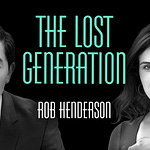Today I spoke with Will Storr, one of my favorite writers. If you haven’t yet, I strongly recommend subscribing to his Substack. Will is the author of many excellent books, including The Status Game, The Science of Storytelling, and most recently, A Story is a Deal.
We did a livestream today covering a lot of ground:
Why so many men struggle with perfectionism, identity, and failure—and how those pressures can lead to quiet despair. Will’s 2015 essay about this here
Will breaks down why, when it comes to good stories, people care more about character than plot
How the best stories constantly shift your perception of a character—making you ask, “Who is this person, really?”
Will shares how status and storytelling are connected—and how understanding that can help you both tell better stories and understand social life.
The most successful stories aren’t built on perfect structure, but on powerful reversals—emotional whiplash seems to outperform classical plot arcs like the hero’s journey
Why the best storytelling isn't about showing off—it's about stripping away everything that doesn't serve the story
Will digs into how people instinctively cast themselves as the hero, and how good writing demands you challenge that instinct
I share how writing Troubled forced me to second-guess my motives, especially the parts that made me look good. Many of those stories were left on the cutting room floor
Whether humans are naturally wired to see life as a story—or if that’s something we learn from books, movies, and culture.
I share the results of a study suggesting we give more moral credit to people who do the right thing despite temptation, not because it comes naturally
We then shift to the psychology of social status
Inverting status symbols is its own flex. Modern aristocrats drive beat-up BMWs and Land Rovers to signal they’re above consumer signaling. Relatedly, I wrote about counter-signaling here
We discuss the differences between power, prestige, and dominance
Will suggests there are 3 ways to earn status: through competence, virtue, or dominance. Each domain has different rules
People strive for status, even if they have no conscious awareness of this. I suggest this is akin to a spider weaving a web. The spider doesn’t “know” why it does this. It acts on instinct honed through millions of years of evolution
Will tells me about the secret unmarked lounges in airports, reserved exclusively for VIPs and the highest tier frequent fliers
Progressive activists—a small, affluent, hyper-educated, and disproportionately white group—are the most likely to endorse luxury beliefs and dominate ideological discourse on social media
Even in luxury settings, people with a strong desire for status struggle to relax. Success often stems from an unrelenting need to prove yourself, even while on vacation
I suggest that the style of self-help messaging that says “You are enough” may be helpful for ambitious and conscientious elites—but harmful for average people, who need more self-discipline and drive, not less
Will points out that people tend to believe they deserve more status than they currently have—a subtle but universal underdog narrative that fuels both ambition and resentment
Join me for my next live video in the app.













